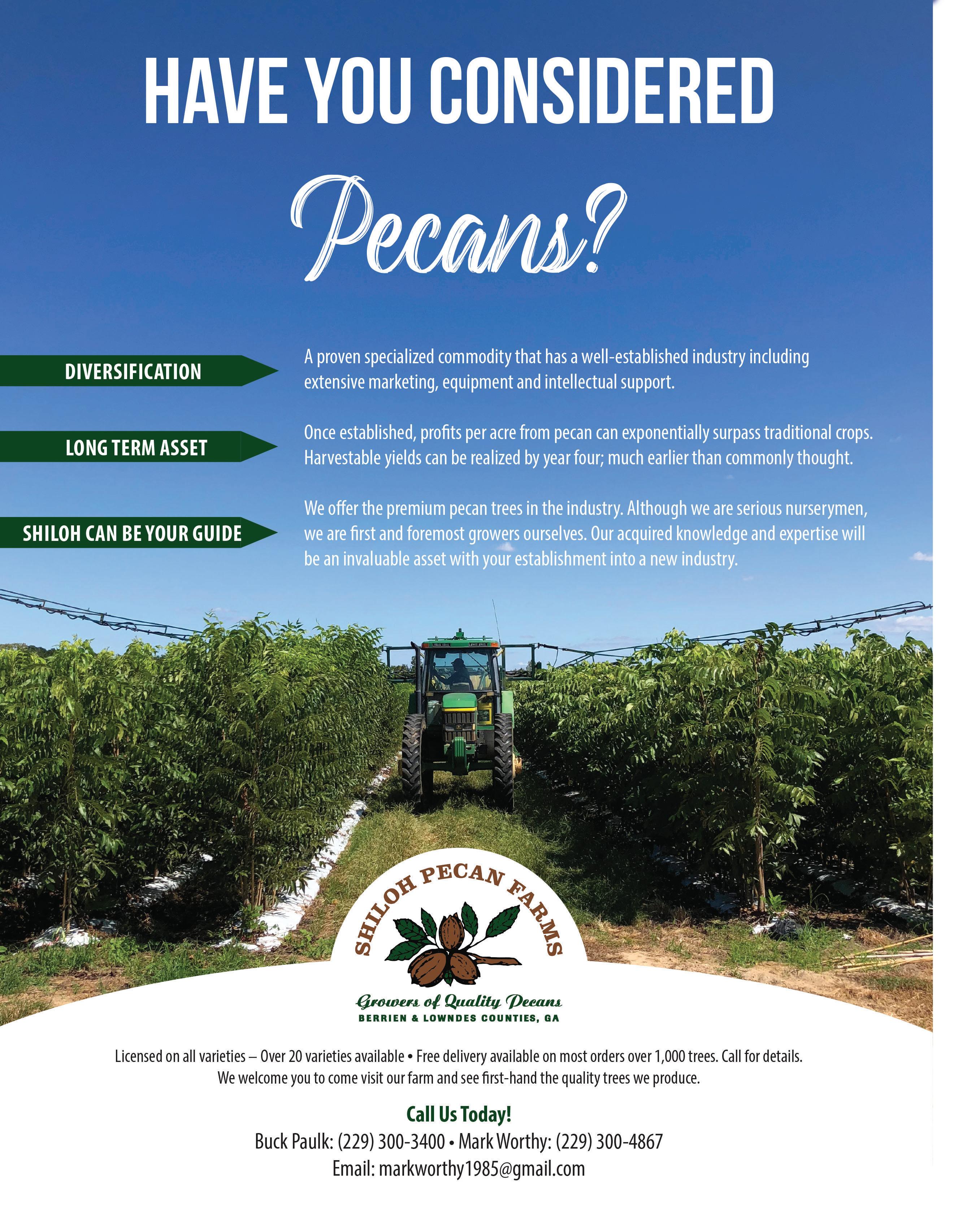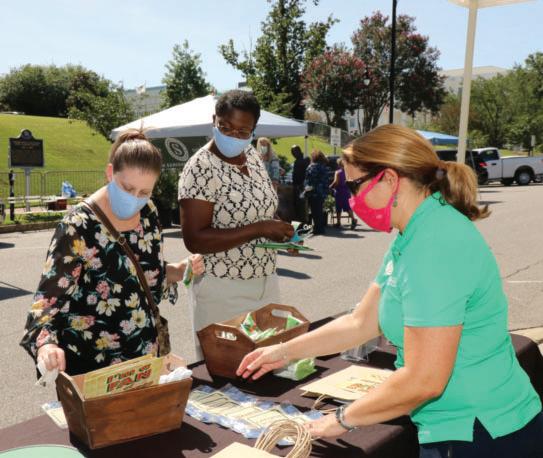
46 minute read
Checkoff Report
Investments Made by Growers for the Future of the Peanut Industry.
APPA attends Sweet Grown Alabama Farmer’s Market
Sweet Grown Alabama is Alabama’s newest initiative to provide a database of Alabama-grown products. Governor Kay Ivey signed a proclamation and declared July 22, 2020, as Sweet Grown Alabama Day. Nearly 30 vendors joined in to celebrate with a farmer’s market in front of the Alabama State Capitol in Montgomery. Vendors sold produce, honey, meat and other locally grown products. Kaye Lynn Hataway, APPA project coordinator, visits with attendees The Alabama Peanut Producers Association provided samples of roasted peanuts and distributed during the Sweet Grown Alabama peanut fans, peanut butter spreaders, jar openers Farmer’s Market at the Alabama and recipes. Approximately 200 people visited theState Capitol in Montgomery, Ala. farmers market during the three-hour event.
APPA Sponsors Social Media Contest for Local United Way
The Alabama Peanut Producers Association sponsored a social media contest for the Wiregrass Area United Way’s Pacesetter Event, which included a drive-thru food drive, July 31, 2020. People donating food were encouraged to post pictures of themselves donating food on social media for a chance to win one of three peanut product baskets provided by APPA. The community donated 15,977 pounds ofAPPA provided peanut baskets to encourage donations at the Wiregrass Area United Way Food food. Approximately 250 cars drove thru, and around 75 people posted a picture for the social Drive. media contest.
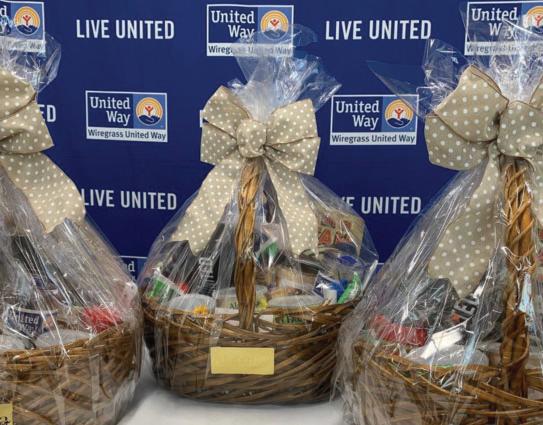
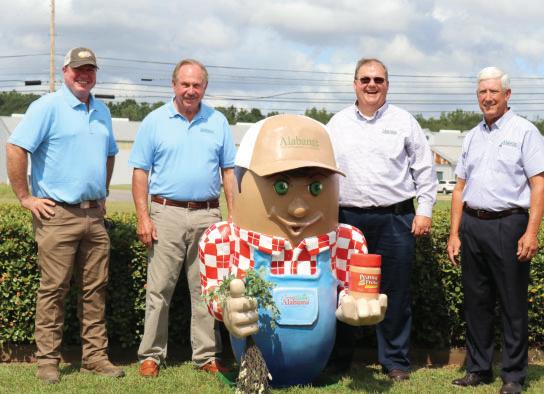
APPA Reveals New Farmer Peanut in Dothan
There’s a new peanut in Dothan, Alabama. The Alabama Peanut Producers Association revealed the newest member of the “Peanuts Around Town” peanut family Tuesday, Sept. 8, 2020. The peanut person is a peanut farmer, of course. With his APPA ball cap and overalls on, he is holding a vine full of runner peanuts and a jar of Peanut Proud peanut butter. The APPA peanut farmer was The first peanut sculpture was put in place in welcomed home by APPA board 2002 at the APPA headquarters as part of the and staff. Pictured left to right. Thomas Adams, APPA board member; George Jeffcoat, APPA Dothan Downtown Redevelopment Authority, public art project. There are currently more than board member; Jacob Davis, APPA 40 peanuts around Dothan. The new peanut statue executive director and Carl gives honor to the approximately 1,000 peanut Sanders, APPA board president. farmers in Alabama.
The Florida Peanut Producers exhibited and attended the 2020 Florida Chapter of the American Academy of Pediatrics Virtual Conference. The in-person conference was canceled as most large gatherings have been because of COVID-19.
Approximately 500 pediatricians, nurses and pediatric students registered and attended the virtual conference. This was a first for Florida Peanut Producers Association as an exhibitor in the virtual exhibit hall. The FPPA provided information on early introduction of peanuts to prevent peanut allergies and encouraged attendees to visit the PreventPeanutAllergies.org website. Many of the attendees visited the FPPA virtual exhibit and requested print resources for distribution to their clients and patients.

Peanut industry donates peanut products for hurricane relief
The state checkoff organizations are once again stepping up and making donations to Peanut Proud. The donations have been made to assist with COVID-19 relief at food banks as well as natural disaster relief from Hurricane Laura and Sally. In 2020, Peanut Proud has shipped more than 460,000 jars of peanut butter to assist food banks.
Peanut Proud is still accepting donations to buy more peanut butter for food banks and disaster areas. To donate, send a check to Peanut Proud, P. O. Box 446, Blakely, Georgia, 39823 or donate online at www.peanutproud.com.
Reports from the: Alabama Peanut Producers Association Florida Peanut Producers Association Georgia Peanut Commission Mississippi Peanut Growers Association

Georgia Peanut Commission partners with Atlanta Hawks Star Trae Young in donating peanut butter to Atlanta-area schools
The Georgia Peanut Commission and the Trae Young Family Foundation partnered to donate 7,200 jars of Peanut Proud peanut butter to metro Atlanta school food pantries during the month of August. Peanut butter, one of the most-requested items among food banks, is one of Young’s favorite snacks he enjoys regularly to stay nourished and ready to play for the Atlanta Hawks. In his recently completed second season, Young was named an Eastern Conference All-Star and finished fourth in the NBA in scoring (29.6 points per game) and second in assists (9.3 assists per game).
The donation took place in cooperation with the Atlanta Community Food Bank and Peanut Proud. Peanut Proud is a humanitarian organization within the U.S. peanut industry working to aid in domestic hunger relief and emergency disaster relief through the distribution of peanut butter. The Atlanta Community Food Bank provides food and grocery products to more than 600 nonprofit partner agencies with hunger relief programs throughout 29 counties in metro Atlanta and north Georgia. Eighteen schools throughout the metro Atlanta area will be utilized for school distributions allowing local families suffering from food insecurity greater access to nutritious meals.
“There are so many people in need of quality meals right now with school starting and the pandemic impacting how all of us live our lives,” Young says. “I am thankful to be working with a great organization in Peanut Proud to help supply families with a nutritious food option during these tough times.”
Young shared a post about the donation with his nearly 750,000 followers on Twitter following the donation. The post garnered 18 comments, 91 retweets and 1,068 likes.
The most recent Hunger in America report by the Atlanta Community Food Bank estimated that 755,400 people in metro Atlanta and north Georgia turn to food pantries and meal service programs to feed themselves and their families each year. This includes more than 164,000 children. “We are so thankful to the Georgia Peanut Commission for their generous donation that will greatly assist our mobile school pantry distributions. These distributions are vitally important in ensuring children in our community receive much needed, shelf-stable necessities, like peanut butter,” Shana Watts, Atlanta Community Food Bank food sourcing specialist says.
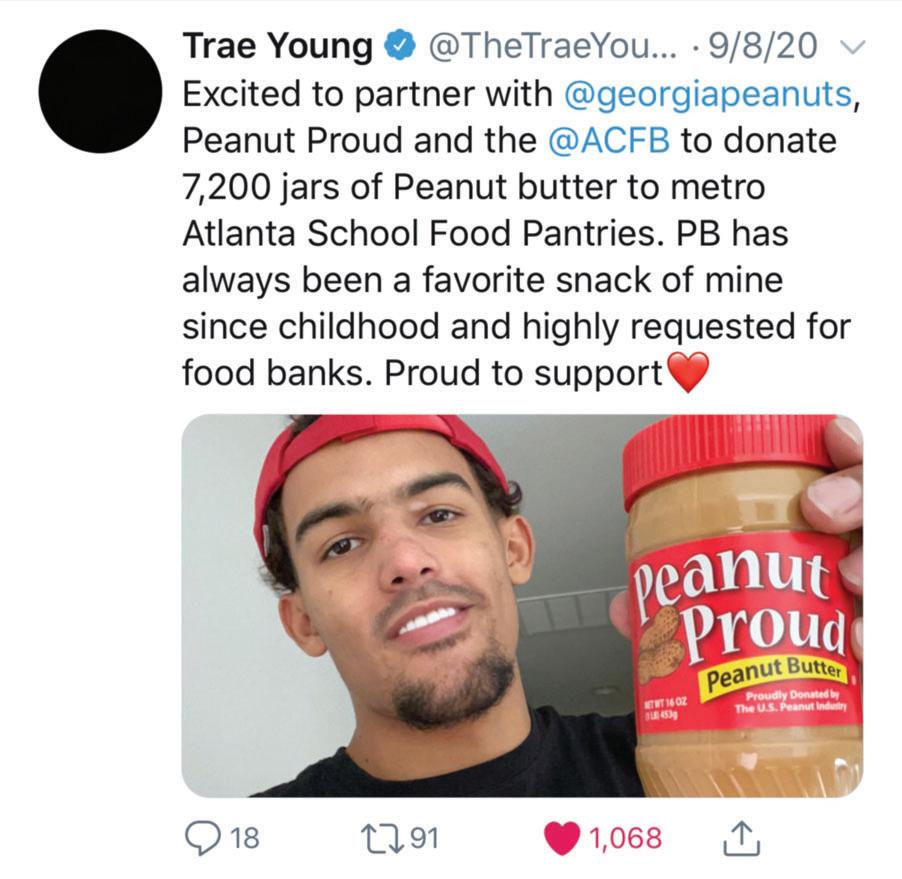
GPC attends the Georgia Nutrition and Dietetics Virtual Meeting
The Georgia Peanut Commission, along with Southern Peanut Growers, attended the Georgia Academy of Nutrition and Dietetics annual meeting, Aug. 19, 2020. Originally scheduled for March 2020, the meeting was postponed due to COVID-19; and therefore, took on a new virtual format.
The virtual meeting hosted 135 attendees, who are registered dietitians and nutritionists. GPC created a dedicated webpage for the meeting, which boasted a variety of nutrition content for dietitians to browse and download. This was shared with 1,200 plus members of the organization, as well as meeting attendees. GPC also hosted a live chat session with attendees to answer questions and provide more resources.
The Georgia Peanut Commission is proud to be a sponsor of Augusta native and UGA All-American, Greyson Sigg. Sigg, a professional golfer, recently earned a spot in the U.S. Open, which took place Sept. 1720 in Mamaroneck, New York.
Prior to his Golfer Greyson Sigg U.S. Open debut, he showcases his golf bag finished fourth on the points list from featuring the Georgia Peanuts logo. the Korn Ferry Tour Series. GPC’s sponsorship with Sigg includes prominent placement of the Georgia Peanuts logo on Sigg’s golf bag, which he carries with him to all golf events.
Learn more about Sigg online at www.pgatour.com.
Alarge part of peanut promotions include on-site events with sampling opportunities. All of those type of events came to a screeching halt in March, during National Peanut Month. As the COVID-19 pandemic continued through the spring, summer and now the fall, peanut organizations found new ways to continue promotion of peanuts and increase consumption.
In 2020, the National Peanut Board kicked off their Spreading Good Campaign. Activations of the campaign were planned out months in advance but had to be reimagined to exclusively online during the pandemic.
“The final waves of programming tap into consumer trends such as the increased interest in baking at home, creating excitement about peanuts and baseball and tapping into a fun, emerging augmented reality technology,” says Ryan J. Lepicier, senior vice president and chief marketing officer with the National Peanut Board.

Consumer Shift
During the months of the pandemic, consumer attitudes have also shifted. Prior to COVID-19 many Americans relied on dining out and ready-to-eat foods from the grocery stores quite a bit. In fact, the average American ate out 4 to 5 times per week. All of that came to a halt when restaurants were forced to close their doors. While many restaurants were able to pivot to curbside takeout and delivery services, it took some time for that to happen depending on the differing rules around COVID shutdowns in different states.
“Many people were looking for affordable and easy meal planning as grocery store shelves were bare and people were limiting the number of times they went out,” says Leslie Wagner, executive director of Southern Peanut Growers.
Conversations about peanut butter also increased on social media during the pandemic.
According to Lepicier, he saw a more than 50 percent increase in social media conversations about peanut butter.
“This makes sense since consumers began stockpiling food and cooking at home as lockdowns went into place in mid-March,” Lepicier says. “In fact, March peanut butter sales were up 75% over March 2019, not surprising considering the panic buying.”
The home cooking trend continued throughout the summer with grocery retailers seeing higher sales.
According to Lepicier, recent social media conversation around peanuts and peanut butter are driven by odd combinations or indulgent consumption moments linked to comfort or boredom, recipes, health tips and affordability.
“Many people have rediscovered, or discovered for the first time, the joys of cooking at home and the cost benefits of doing so,” Wagner adds.
To provide meal ideas, Southern Peanut Growers started creating 3-ingredient, pantry-friendly recipes for the whole family, new InstantPot recipes and single serving desserts to reduce handling as people began to visit with small groups of family and friends again.
Education
Another aspect of promoting peanuts includes continued education on the nutritional and healthy attributes of peanuts and peanut butter. Since so many events were canceled, NPB and SPG turned to technology to continue their work with educating health professionals about early introduction of peanuts to prevent peanut allergy.
Both organizations have been participating in virtual trade shows and advertised in professional publications and newsletters. In June, NPB partnered with the Egg Nutrition Center to host a virtual seminar, “LEAPing Past Food Allergies,” featuring NPB’s own allergy expert, dietitian Sherry Coleman Collins and Dr. Gideon Lack, the lead investigator of the groundbreaking LEAP study. More than 1,100 health professionals attended and received continuing education credits.
In foodservice outreach, NPB partnered with The Peanut Institute to bring school nutrition professionals innovative approaches to meal delivery and best practices to provide meals to students during a pandemic.
“While many places such as restaurants and schools were shut down, our peanut messaging was no less important,” Wagner says. “We were forced to explore and embrace new methods of outreach from virtual exhibits, social media promotions and special email sponsorships to deliver our information.” t BY JOY CROSBY

SOCiAL FARMiNG
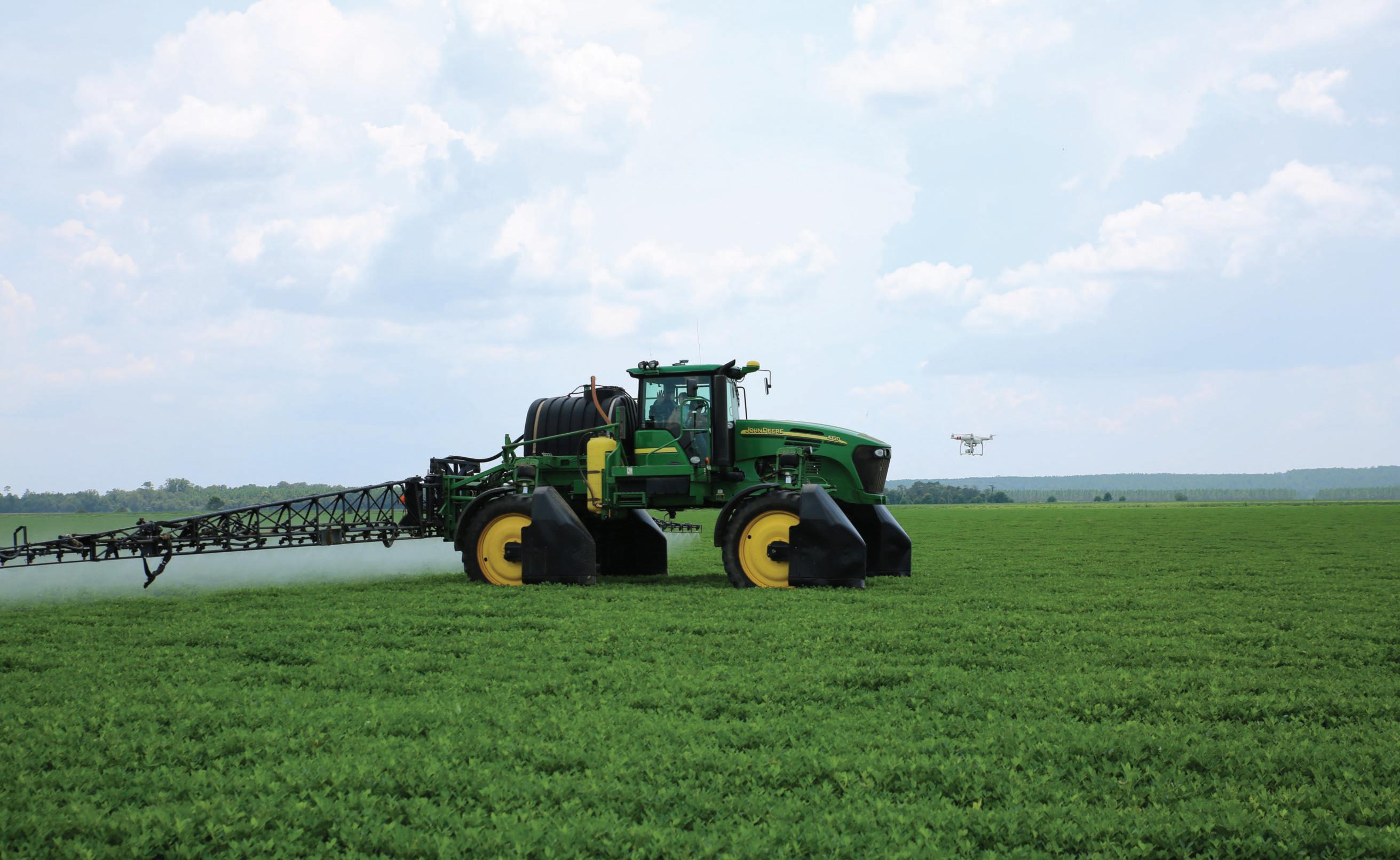
Connecting consumers to the farm
Ryan Jenkins of Jay, Florida, is a farmer with a vision. A vision to reach consumers and connect them to the family farm. He connects with them through factual and unique stories, photos and video on social media.
Jenkins is a peanut, cotton, corn, wheat and oat farmer. He uses social media platforms to educate consumers on how and where their food and fiber comes from, the process in which it gets to them and tells the stories of the real American farmers who produce it.
His story is unique. Before he began farming full-time, he worked for years with EMS and life flight. Living near the Pensacola area, he has many friends he calls “city friends” who are curious about farming. He recalls, “they would always ask me questions about what I did on the farm during my days off from EMS.”
Fast forward to 2016, when Jenkins participated in the Peanut Leadership Academy. During one of the leadership sessions, a speaker discussed how farmers need to tell their story more to connect with consumers. That’s when it clicked for Jenkins and he realized he needed to tell his story.
“You better tell your story or
Ryan Jenkins, Jay, Fla., records a video while using GPS to drive his tractor. Jenkins strives to connect consumers to the farm through the use of video, drones and social media.
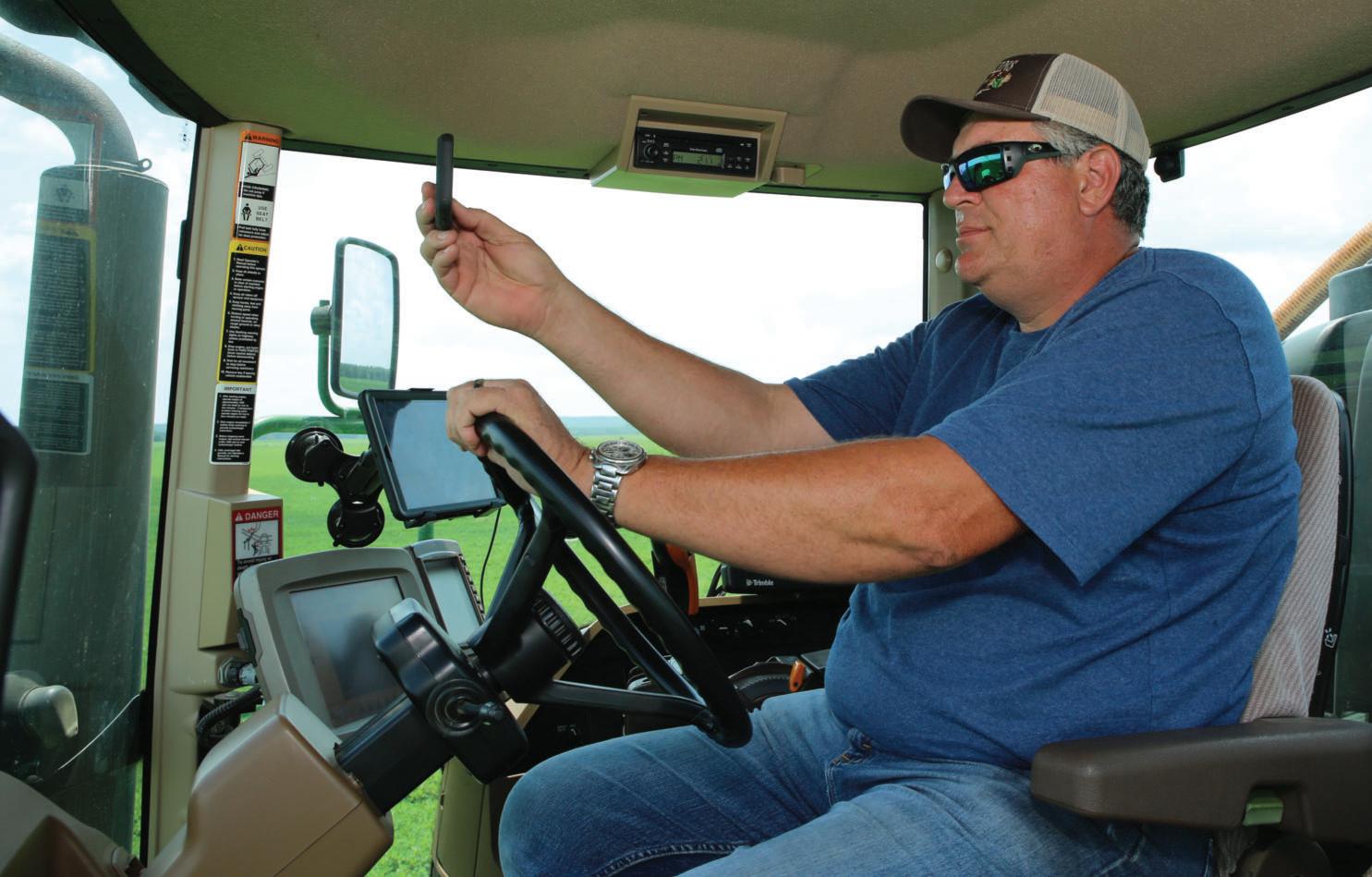
someone else will, really resonated with me,” Jenkins say. “I’ve fallen in love with explaining to people and really educating people on what we do on the farm and why we do it.”
Jenkins has several motives for sharing his story including his love for agriculture.
“One, I love what I do and when you love something you want to show everyone else,” Jenkins says. “You have pride in it.”
According to Jenkins, he hopes to connect the consumer with a farmer.
“I want consumers to understand that at the end of the line there is a family they are helping out when they buy food or other products,” he says. “This is a person, not a big corporation, when they buy their peanut M&M’s or Hanes t-shirts.”
He hopes that if consumers make the connection to the farm then they will be more comfortable in the products they are buying and hopefully want to buy more to help farmers out.
He started a YouTube channel in 2019 that features videos of his farm’s production geared directly to the consumer. Since creating his channel, Jenkins has published more than 25 videos on peanut, cotton and oat harvest and production.
“In the past, it would take a film or news crew and now we can shoot the video with our phones and put it on social media for thousands of people to see,” Jenkins says.
The videos explain some of the basics on how the crops grow but also cover how farmers prepare for hurricanes, the view from a tractor cab as the farmer is moving equipment, general equipment maintenance and more. Jenkins published a farm safety video in the spring and fall of 2020 to educate consumers about sharing the roads with farmers.
“I wanted to show consumers what it is like from the farmer’s perspective and view from inside the cab of the tractor,” he says. “Who knows, you might even save a life. And even if you don’t save a life, you have opened up a dialogue with people. You have made it where they might want to ask you questions. They see that you are interested in helping the public understand what is happening on the farm.”
Jenkins was one of two producers to be chosen by Progressive Farmer magazine to be featured in its “View from the Cab” spotlight. He is the first peanut farmer to be selected. Through the spotlight, he is even able to educate other farmers about crops grown in the Southeast and specific issues Southeastern farmers may face.
Jenkins is also passionate about connecting youth to agriculture and career opportunities in agriculture.
“I feel like it is our responsibility as much as possible to connect the youth with agriculture,” Jenkins says. “It takes a special person to be a farmer. I do feel like if you were not born into farming then it is hard to get started. So, I want to show the kids that there are thousands of opportunities in agriculture that do not include driving the tractor or owning a farm.”
To connect youth to agriculture, Jenkins Farm held an Ag Career Day this past year. The event featured 17 presenters including farmers, truck drivers, welders, ag lenders, researchers from the University of Florida and more. The event helped to show kids the college prepared jobs and non-college prepared jobs connected to agriculture.
Jenkins has also presented information at a virtual Florida Farm Bureau event where he discussed how to reach consumers through his social media efforts on the farm. Recently, Jenkins was named the Florida Farm Bureau’s 2020 Volunteer Communicator of the Year.
Jenkins is a strong and passionate voice for agriculture and an outstanding representative to connect consumers to the farm. According to Jenkins, there is so much bad news and untrue news in the world concerning agriculture.
“I think it is important for consumers to see exactly how advanced we are in agriculture – the technology we use on the farm and how we use it to be a better steward of the land as far as doing more with less inputs,” Jenkins says. “I believe the reason some people are believing some of the things they do concerning agriculture is because the general public is too far removed from the farm. So, I feel like it is our job as farmers to tell our story and let consumers see what really happens on the farm.” t
Above: Jenkins Farm is a family operation that includes (left to right) Rennie, Ryan, Cole and Chase Jenkins.
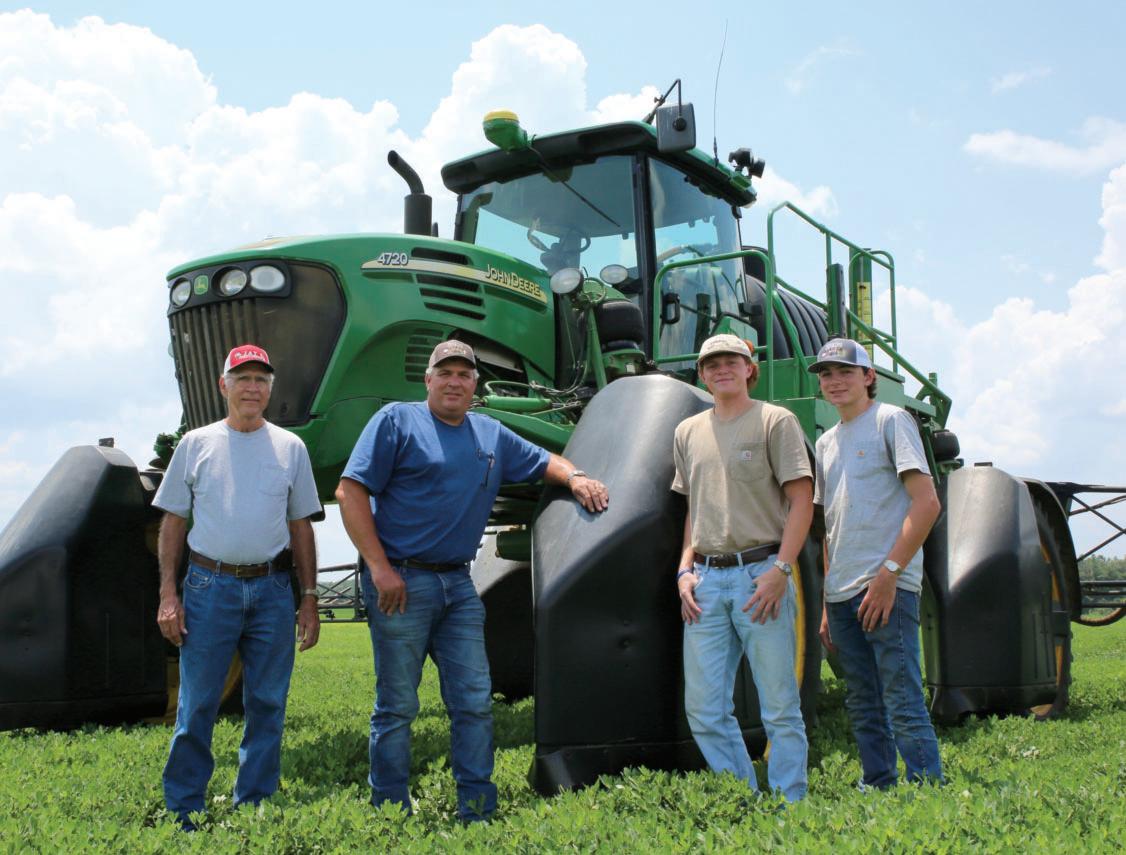
Right: Ryan Jenkins tries to incorporate consumer friendly items in his social media posts by showing Peanut M&M’s inside a peanut shell.

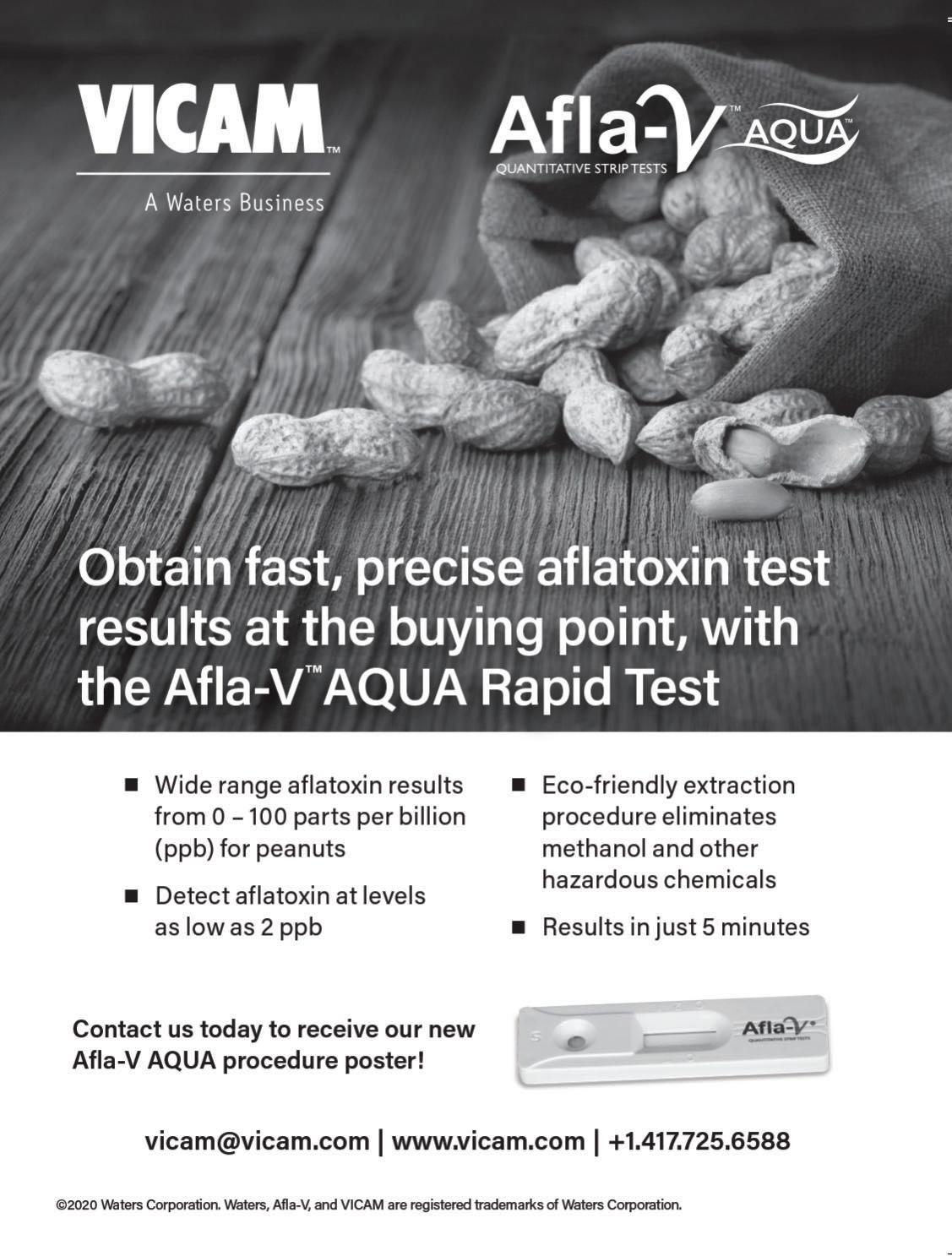
Virtual Field Days Offer Online Learning
Being able to stand in research plots and hear first hand from scientists are normal events for farmers to attend in the months of July through September. The reports provide farmers with the latest information they need to make decisions for their farming operation. All of those in-field events took a virtual spin this year with many universities and the Sunbelt Ag Expo offering online video opportunities.
The 2020 Sunbelt Ag Expo Field Day was held July 23, and farmers were able to learn practical information from the region’s top agricultural scientists about the newest technologies farmers can use to improve their operations. Attendees were Steve Li, Auburn University weed scientist, talks to farmers through social distancing at the 2020 able to drive through the Darrell Williams Wiregrass Research and Extension Center’s Wiregrass Weed Tour in Headland, Ala., on Aug. 13. Research Farm and watch videos from conducting that research are working with Research and Extension Center (WREC) in university researchers and vendors. us to overcome the challenges that have Headland, Alabama. Attendees parked in Farmers were allowed to pull aside at stops been presented.” the field and listened to the presenters by that particularly spark their interest to In August, farmers in East Georgia tuning to an FM frequency. The presentafurther investigate plots and visit one-on- were able to learn more through the virtual tions are also available online through the one with the researchers. field day at the University of Georgia Wiregrass Research and Extension Center
“We have the unique ability to work Southeast Georgia Research and Education Facebook page. with university and corporate researchers Center in Midville, Ga. The staff at WREC facilitated social on our Darrell Williams Research Farm, Research at the Midville center is distancing guidelines during the tour, and where we continue to conduct cotton, geared to the needs of farmers in east attendees said they appreciated the new peanut, corn, soybean and forage research Georgia due to growing conditions that are approach. — all aimed at improving the farmer’s much different than those that producers Additionally, farmers in Georgia were bottom line,” says Chip Blalock, Sunbelt experience in other parts of the state. able to learn more about peanut and cotton Ag Expo executive director. “This year, we Additionally in August, Alabama management through the University of presented the research being conducted in farmers were able to learn more from the Georgia Cotton and Peanut Virtual Field a different format. We are encouraged that Wiregrass Weed Tour at the Wiregrass Day. The event, sponsored by the Georgia those individuals and companies Peanut Commission and Georgia Cotton Educational Videos Commission, included video presentations focusing on variety development, weed, Sunbelt Ag Expo Field Day disease and insect management with https://sunbeltexpo.com/field-day/ peanuts and cotton. Late last year and through early 2020,
Southeast Georgia Research and Education Center (Midville) Field Day https://segeorgia.caes.uga.edu/ University of Florida faculty involved with peanut related research and extension efforts met to form the Florida Peanut Georgia Cotton & Peanut Virtual Field Day http://www.gapeanuts.com Team. Among the goals of the team are to provide research-based solutions to peanut farmers and to provide hands-on training Florida https://nfrec.ifas.ufl.edu/florida-peanut-team/ for county extension faculty as they work with Florida peanut farmers. COVID-19 caused cancellation of the Santa Rosa County Peanut Variety Demonstration Tour http://bit.ly/santarosapeanutdemotour in-person training and field day events that were planned in Florida, but the team has developed a website to provide an Wiregrass Research & Extension Center Virtual Field Day www.alpeanuts.com assembly of peanut production information from planting through harvest. t (Click on Growers and Industry Research for a link to the videos.)
Also, follow the Wiregrass Research & Extension Center on Facebook for additional videos. BY JOY CROSBY


No Easy Fix for 2020 Peanut Efficiency
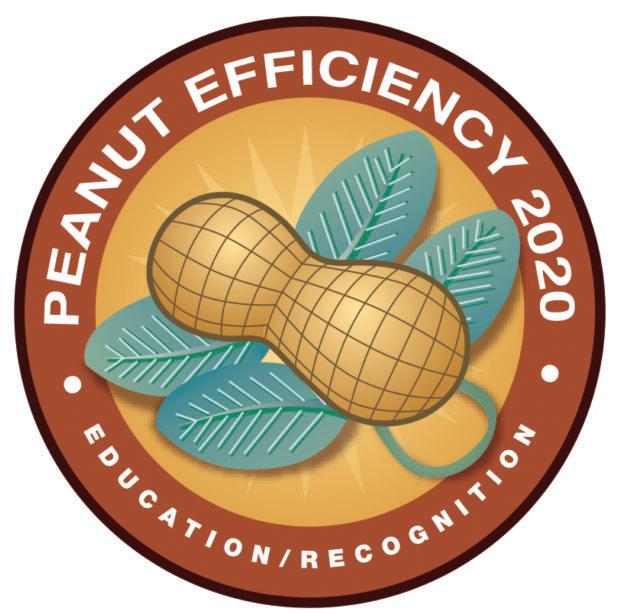
Winners
Peanut farmers have no Wilson Jones Jr. panaceas available to assure “Time is the main thing,” he says. top yields and high grades. “Don’t put off tomorrow what you can do The best ones, including the today. Get your peanuts planted on time. four 2020 Farm Press Peanut Efficiency Make timely applications of fungicides or Award (PEA) winners, follow finely anything else that needs to be done.” tuned production systems tailored to The timeliness approach works. The specific growing conditions. family historically has made yields
The 2020 winners are: Kirk Jones, approaching 4,500 pounds per acre and Upper Southeastern states; Joe Mullek surpassing 5,000 pounds in good years. and sons Tim, Michael, and Mark, Lower The family farms 1,700 acres of both Southeastern states; father and son, Glen owned and rented land, producing cotton, and Aaron Martin, Southwest; and Van corn, soybeans, wheat, peanuts and cattle Hensarling, Mid-South. in Virginia’s Isle of Wight County.
Two of this year’s winners grow only Peanuts are Kirk’s favorite crop, his or mostly dryland peanuts; one carefully passion. manages limited water resources; one They planted Bailey, Virginia-type depends on season-long timeliness to peanuts, on all 390 peanut acres this year. improve his odds. They all practice Bailey has been the family’s go-to variety sustainable production practices and take for the past few years. “I like the way advantage of every system available to Bailey yields. I like the rankness of the improve production efficiency. vines because I feed the vines to my
Keys for these outstanding growers cows,” Kirk says. include: timing, variety selection, rotation, J.W. and Kirk use a three to four-year conservation, water management, pest rotation and like to stretch their rotation control, fertility and harvest efficiency. to four years when they can.
Here is a quick look at some of the 2020 winners’ keys to productivity. Lower Southeast Two decades ago, the Mulleks started growing peanuts in Baldwin County, Alabama, one of first in the area. Their farm remains somewhat unusual. Tim, 50, Joe Mullek’s oldest son, farms in partnership with brothers Michael, 44, and Mark, 43, in Summerdale, 20 miles from the Gulf of Mexico. They produce sustainable, highyielding peanuts. Kirk Jones Windsor, Virginia They farm 3,000 acres, a third in peanuts, 60 percent in Georgia-12Y, 20 percent Georgia-06G and 20 percent Upper Southeast FloRunTM ‘331’. The Georgia-12Y offers
Kirk Jones, Windsor, Virginia, says higher yields and better disease tolerance. timeliness is key. It’s a lesson he learned Most peanut producers in the area plant from his grandfather James Wilson Georgia-06G. “Buddy” Jones and his father James They plant cotton on two-thirds of
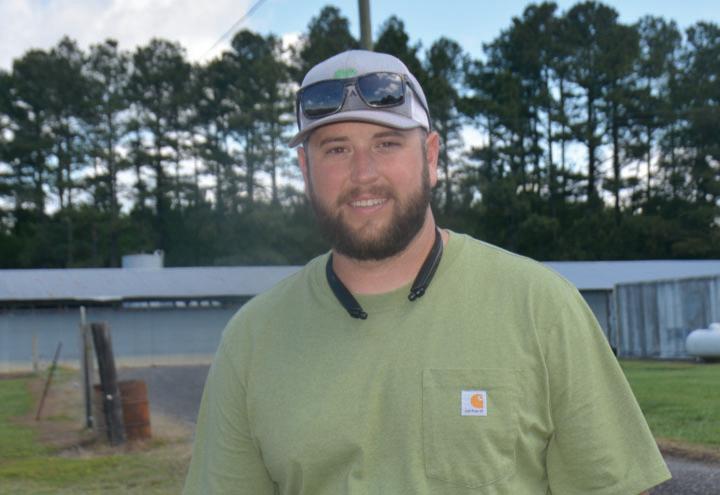
Mark, Tim and Michael Mullek Summerdale, Alabama their acreage on a three-year rotation with peanuts. They plant wheat after peanuts, followed by two years of cotton; they get four money crops out of the rotation. They don’t irrigate.
Their production system centers heavily on a sustainable, no-till approach. Except for the peanut digger breaking a third of the land every third year, the soil goes unbroken. Soil is a silent employee, working for them and taming some variables that can stress an operation and its owners.
In 2019, they averaged 4,852.5 pounds per acre with exceptional grades and average selling prices of $425 per ton. Their 2020 wheat averaged 60 bushels and 2019 cotton averaged two bales.
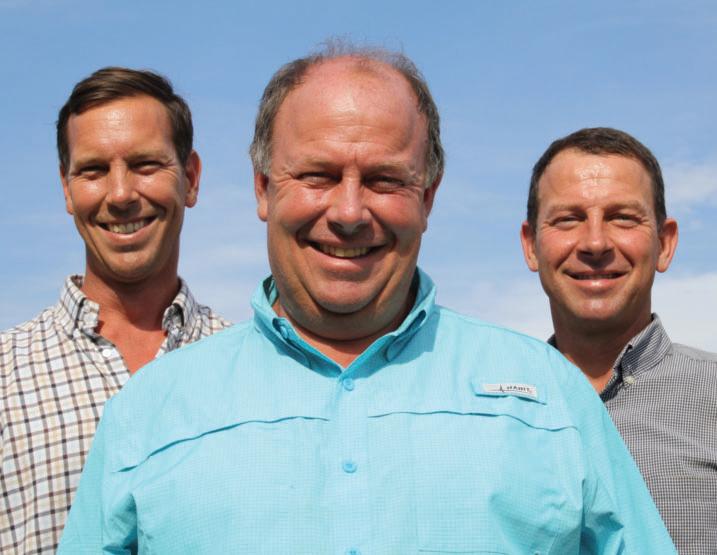
Southwest Region
Father and son, Glen and Aaron Martin, say water is key to producing high peanut yields on the sandy soils near Wellman, Texas.
“We’ve cut back on the number of acres of peanuts we grow, so we’re not trying to plant more acres than we can water but keep enough water to make yields,” Glen says.
Glen and Aaron, through A&G Farms partnership, grow Georgia-09B, a runner-
Aaron and Glen Martin Wellman, Texas type variety. In 2019, they averaged 5,619 pounds per acre and 5,697 pounds in 2018 at $475 per ton.
Maintaining plant health is also essential, including crop rotation and use of pre-emergent herbicides and inoculants. One of the chemicals in their arsenal is Velum nematicide.
“We’ve started using Velum on every acre of peanuts. It keeps the vines healthy in the fall when we start having disease or weather issues that could make them crash,” Glen says. “It’s expensive, but it’s worth it.”
Glen and Aaron also credit their crop consultant Mark Scott, their wives and their employees for their success.
“We couldn’t do any of this without good employees,” Aaron says.
Glen and Aaron, generational peanut farmers, proud PEA winners, follow dad and grandad James Martin, the first PEA winner for the Southwest in 2000. Van Hensarling Richton, Mississippi
Mid-South
“If it weren’t for peanuts, I probably would not be farming,” says Van Hensarling, Richton, Mississippi. “Peanuts are about the only crop that makes money.”

Hensarling has grown peanuts for 23 years on his south Mississippi farm. He farmed with his dad while still in high school, using his dad's equipment but making his own crops. He farmed leased land on his own after high school and bought his first farm in 1981, raising soybeans and wheat.
“I enjoy growing peanuts,” Hensarling says. “I started during the quota system. I transitioned from soybeans and wheat to 100 percent cotton in 1995 and 1996. I added peanuts in 1997. I had to gear up for peanuts. Fortunately, I had an understanding banker.”
He farms with his wife, Anita, and sons, Jerid, 40, and Brad, 37.
Hensarling embraces efficiency, including producing all but 75 of his 800-acre peanut crop without irrigation.
“To make yields, we have to look at every aspect—rotation, fertility, weed control, fungicides, and harvest efficiency. We have to map out all production areas. There is no one silver bullet in it.”
He averaged 5,411 pounds on 725 dryland and 6,500 pounds on 75 acres of irrigated peanuts in 2019.
The four winners, were to be honored July 18 at the Southern Peanut Growers annual conference in Panama City Beach, Florida. The conference was postponed due to the COVID-19 pandemic, so the 2021 conference. t
ARTICLE PROVIDED BY FARM PRESS


2020 winners will be recognized at the
R-E-S-P-E-C-T
Smith retires after 40 years of top-notch writing
Ron Smith recently retired after 40 years at Southeast Farm Press, Southwest Farm Press and Delta Farm Press. According to Smith, farming has changed a lot in 40 years but the farmer’s resiliency, the love for what he does, his faith and his commitment to making the land better has not changed.
Heck yeah, Ron Smith is a top-notch writer. One of his co-workers described him as the Nolan Ryan, Tiger Woods and Michael Jordan of ag writers. After 40 years at Southeast Farm Press, Southwest Farm Press and Delta Farm Press, though, it’s his respect and passion for his subjects that shine through.
“Farmers work miracles every day. They do things with seed and soil, sun and water, that make it possible for the rest of us to survive,” says Smith, who retired in August.
“Over the years, Ron has always talked about producers being the foundation of agriculture and he was very passionate about helping them. That’s what he did with his writing,”
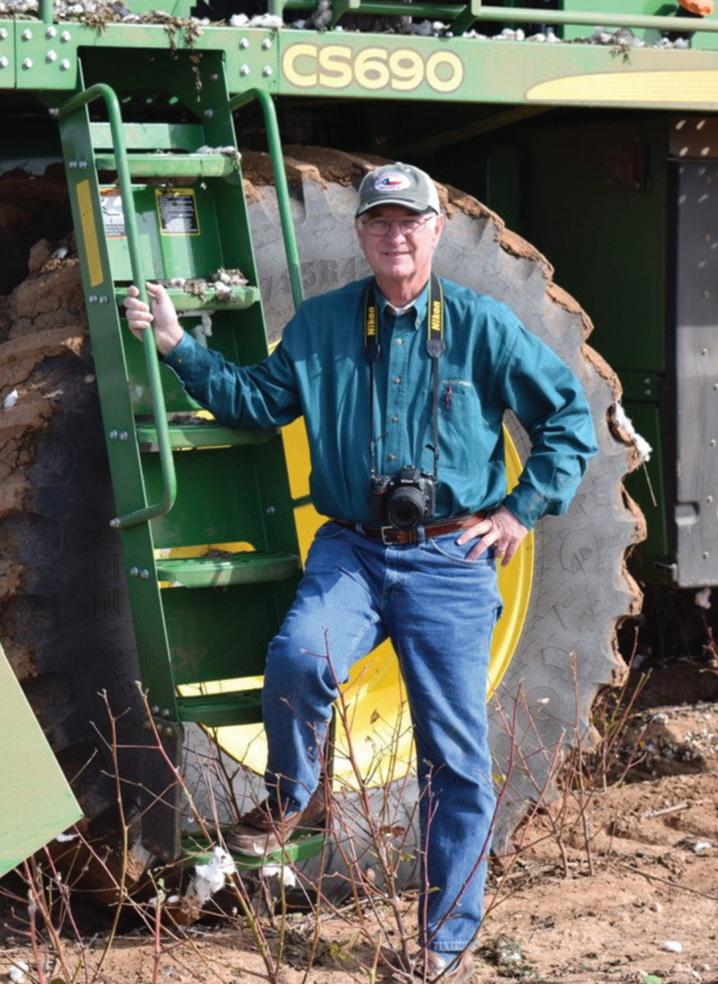
Photo credit: Mary Jane Buerkle, Plains Cotton Growers says Marshall Lamb, director of the National Peanut Research Lab.
While Smith wrote about everything from avocadoes to zucchini, with a few hogs and cattle thrown in, cotton and peanuts were his favourite subjects. Once again, it comes down to respect. “They require so much management. You can’t just plant them and leave.”
For a man who was passionate about his subjects, however, his career was not planned. “In high school, I didn’t even know my job existed. My long-term goal was to teach English and coach baseball.”
After graduating from Lander University with a Bachelor of Arts in English, Smith ended up at a weekly newspaper for three years, then went to Clemson University for his masters degree. At that point he upgraded his goal to teaching Shakespeare at a junior college.
“Instead, I ended up doing interviews bouncing over terraces in a fertilizer spreader truck,” Smith says. “Only God could decipher my notes when I’d get through, but He probably wasn’t that interested.”
The bridge between Shakespeare and a spreader truck was a temporary editor’s job at a Clemson experiment station, followed by an ag editor’s position in Clemson’s extension service. After those two ag warm-ups, he went to work for Southeast Farm Press in June 1978 and moved to Atlanta.
“Everything good in my life happened because I was in Atlanta and worked for Southeast Farm Press,” Smith says. That includes meeting his bride of 40 years, Pat, who was teaching school in Auburn when an Auburn University friend set them up. Most of their courting was done over the phone.
“I had a hefty phone bill but it was a good investment,” he notes.
Smith says the years spent with Southeast, Southwest and Delta Farm Press were also sound investments.
“The best part was talking to farmers. I’d get out on their farm, sit at their kitchen table, they’d tell me about their farm, then we’d hop in their pickup truck and they’d show me a field, or how they’d solved a drainage problem or new technology they were using. They all treated me like royalty. Almost every time I left a farm, I felt like I had made a new friend,” he says.
Smith is in awe of the changes that took place during those 40 years.
“The technology - when I first started, tractors were relatively small. Nobody used computers. Nobody could have imagined variable rate technology and auto steer tractors,” Smith says.
“The varieties are so much better. In 1980, two bales of cotton an acre was a big yield. Now, four bales is pretty common.” Ditto with peanuts. “Now, it is not at all uncommon to see 5,000 lb. an acre yields.”
“There are a whole lot fewer farmers, farms are bigger and more efficient,” he continues. “The risks are so much greater. What hasn’t changed is the farmer’s resiliency, the love for what he does, his faith, and his commitment to making the land better.”
Now, rather than having a full-time front seat in agriculture, Smith is hiking to waterfalls around his Johnson City, Tennessee, home, casting flies in mountain streams, cheering on his three grandsons, or maybe writing another novel, (his first, Passing Through, can be found on Amazon).
The respect and passion are still there, though. He is carving out time to free-lance for the Farm Press publications, plus, he’s already looking for an excuse to go to next year’s peanut show. He’s quick to say, “I already miss the people.” t

Georgia Peanut Farm Show and Conference set for Jan. 20 - 21
Producers can fine-tune their farming operation with information gained at the 45th annual Georgia Peanut Farm Show and Conference, held at the University of Georgia Tifton Campus Conference Center in January. The event will be held Wednesday, Jan. 20 from 1:00 to 5:00 p.m. and Thursday, Jan. 21, from 8:00 a.m. to 2:30 p.m.
Peanut farmers and those involved in the peanut industry will be able to learn more about the latest products, services and peanut research at the 2021 Georgia Peanut Farm Show and Conference. The show is sponsored and coordinated by the Georgia Peanut Commission. The two-day show offers farmers NEW FORMAT - TWO DAYS the opportunity to view the products and services of more than 100 exhibitors and Peanut farmers and those involved in the peanut industry will be able to learn more about the continuing education for the 2021 latest products, services and peanut research at the Georgia Peanut Farm Show set for production season. The Georgia Peanut Jan. 20-21, 2021, at the University of Georgia Tifton Campus Conference Center. Farm Show Committee decided to transition to the two day format for 2021 Foundation, Southern Peanut Farmers $40,000 in door prizes afterward. The to allow more room for social distancing. Federation and the Georgia Peanut Georgia Peanut Commission will present
The University of Georgia will Commission. Growers will be able to a short program beginning at 12:15 p.m. present an educational peanut production learn about farm-saved seed, peanut that will cover award presentations and seminar on Wednesday afternoon and on varieties available for 2021 and varieties other special recognitions. Thursday morning from 9:00 until 10:30 on the horizon. The Georgia Peanut Commission, in a.m. Farmers will also have the cooperation with One Blood, will hold a
An industry seed seminar will also be opportunity to earn credit toward their blood drive from 8:00 a.m. to 2:30 p.m. at held Wednesday afternoon and Thursday private or commercial pesticide the UGA Tifton Campus Conference morning from 10:35 to 11:35 a.m. This applicator certification. Center during the show on Thursday. event is sponsored by the American On Thursday, a free luncheon begins For more information on the show, Peanut Shellers Association Committee at noon for all attendees, with an contact GPC at 229-386-3470 or online at on Variety & Seed Development, Peanut opportunity for farmers to win more than www.gapeanuts.com. t
Georgia Young Peanut Farmer Award Nominations Due Dec. 1
Nominations are now open for the community service activities. applicants from each county in Georgia. Outstanding Georgia Young Peanut “We have so many young peanut Applications are due to the GPC Farmer. The state winner will be farmers making a difference in their office by Dec. 1, 2020. The application is announced during the Georgia Peanut communities and I consider this awards available on the GPC website at Farm Show on Thursday, Jan. 21, 2021, in program a great opportunity to recognize gapeanuts.com or by calling the GPC Tifton, Georgia. The award is sponsored one young peanut farmer for their office at 229-386-3470. by the Georgia Peanut Commission contributions to the agricultural industry,” The award winner receives (GPC) and BASF. says Armond Morris, GPC chairman. registration and hotel accommodations to
The Outstanding Georgia Young The award is open for any active attend the Southern Peanut Growers Peanut Farmer Award is based upon the Georgia peanut farmer who is not over 45 Conference in July 15-17, 2021, at the applicant’s overall farm operation; years of age, as of Jan. 21, 2020. An Edgewater Beach Resort, Panama City environmental and stewardship practices; individual may receive the award only Beach, Florida, and a sign to display at and leadership, civic, church, and once. There is no limit on the number of his or her farm. t
18
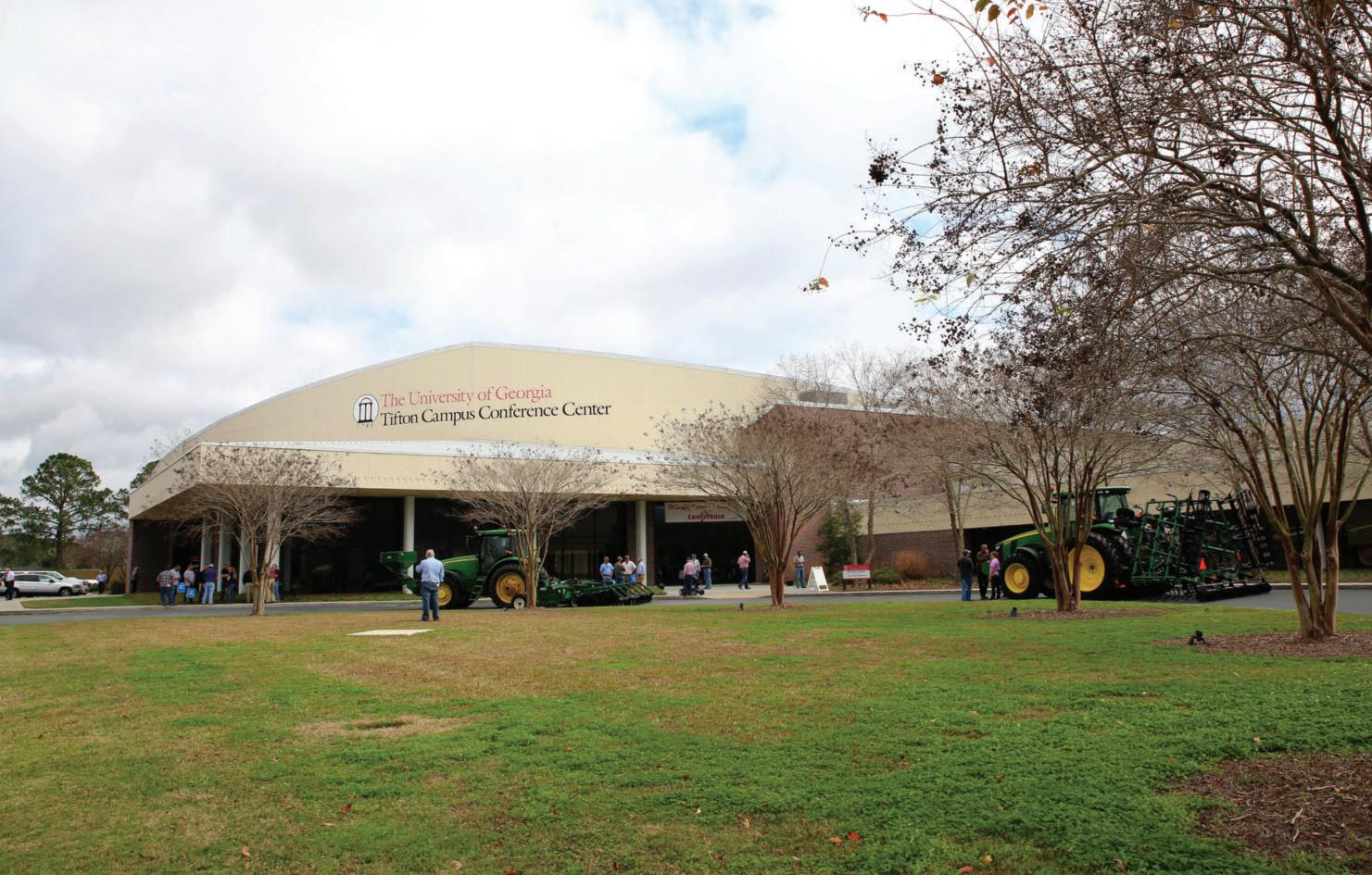

Georgia Peanut Achievement Club Announces High Yield Farmers
Fourteen farmers were recently announced by the University of Georgia Peanut Team for their high yielding peanuts in 2019. The high yields ranged from 4,540 to 7,285 pounds per acre.
According to Steve Newberry of Louisville, Georgia, timing and paying attention to details are the two things that helped him and his sons, Robert and Daniel, achieve the highest yield across the state of Georgia in 2019. Their 2019 yield topped the state at 7,285 pounds per acre.
“Many of the state winners combine their management practices of crop rotation and critical timing of applications to reach these high yields,” says Scott Monfort, University of Georgia Extension peanut agronomist. “The yields are The 2019 Georgia Peanut Achievement Club overall state winner is Newberry Farms in Louisville, counted for the entire farm, irrigated or Ga. Pictured left to right: Robert, Steve and Daniel Newberry credit their rotation, application timing dryland; and they continue to increase and attention to detail, which helped them achieve the highest state yield for peanuts in 2019. year after year.” look out for or when it is time to pull soil category and Bob McLendon, Calhoun
A good three to four-year rotation is samples or check for nematodes,” Steve County, with 5,693 pounds per acre in the a common practice touted by the says. “That’s part of the whole picture - to 700-plus acreage category. University of Georgia Peanut Team as know and remember those details and The District 2 winners are John being beneficial for peanuts. The take care of those things when they need Gaines Jr., Baker County with 6,891 Newberry family can agree to the benefits to be done.” pounds per acre in the 100-299 acreage on their farm. He adds, when you put it all together, category; Jeff Williams, Miller County,
Their peanut acreage in 2019 was along with the research, you end up with with 5,888 pounds per acre in the 300-699 planted in a field that never had peanuts a good result. “The research allows us to acreage category and Parker Heard, grown on it before. The land had timber do better and have better varieties to Decatur County, with 6,292 pounds per for many years and was recently cleared grow. There’s no way we could achieve acre in the 700-plus acreage category. for crop land. The Newberry family the yields that farmers are getting today The District 3 winners are Larry Ray planted two years of cotton before with peanuts without research funding.” Walker, Ben Hill County with 5,740 planting peanuts in 2019. They also The 2020 crop is looking really good pounds per acre in the 100-299 acreage installed irrigation on the land. so far for the Newberry family and Steve category; James Hitchcock, Washington
“I give credit to my sons for paying hopes for decent weather for harvest. County, with 6,374 pounds per acre in the attention to the details and staying on The 2019 Georgia Peanut 300-699 acreage category and Ken Hall time with fungicide and pesticide Achievement Club overall state winners Farms, Worth County, with 5,540 pounds applications and irrigation,” Steve says. are Steve Newberry, Jefferson County per acre in the 700-plus acreage category. “They do what needs to be done when it with 7,285 pounds per acre in the 100-299 The District 4 winners are Brenda needs doing and that’s the reason, we acreage category; Scott Moore, Dooly Reeves, Irwin County, with 7,045 pounds resulted with the kind of yield we did.” County with 6,717 pounds per acre in the per acre in the 100-299 acreage category;
Steve also gives credit for the 300-699 acreage category and 4 Miller Andrew Grimes, Tift County, with 6,016 assistance they receive from their local Farms, Seminole County with 7,066 pounds per acre in the 300-699 acreage county Extension agent, Pam Sapp, and pounds per acre in the 700-plus acreage category and Nellwood Farms, Bulloch the research funding from the Georgia category. County with 4,540 pounds per acre in the Peanut Commission. The District 1 winners are Hillside 700-plus acreage category. t
“We are constantly receiving Farms (Mike Newberry), Early County, messages from Pam about new issues to with 7,002 pounds per acre in the 100-299 BY JOY CROSBY
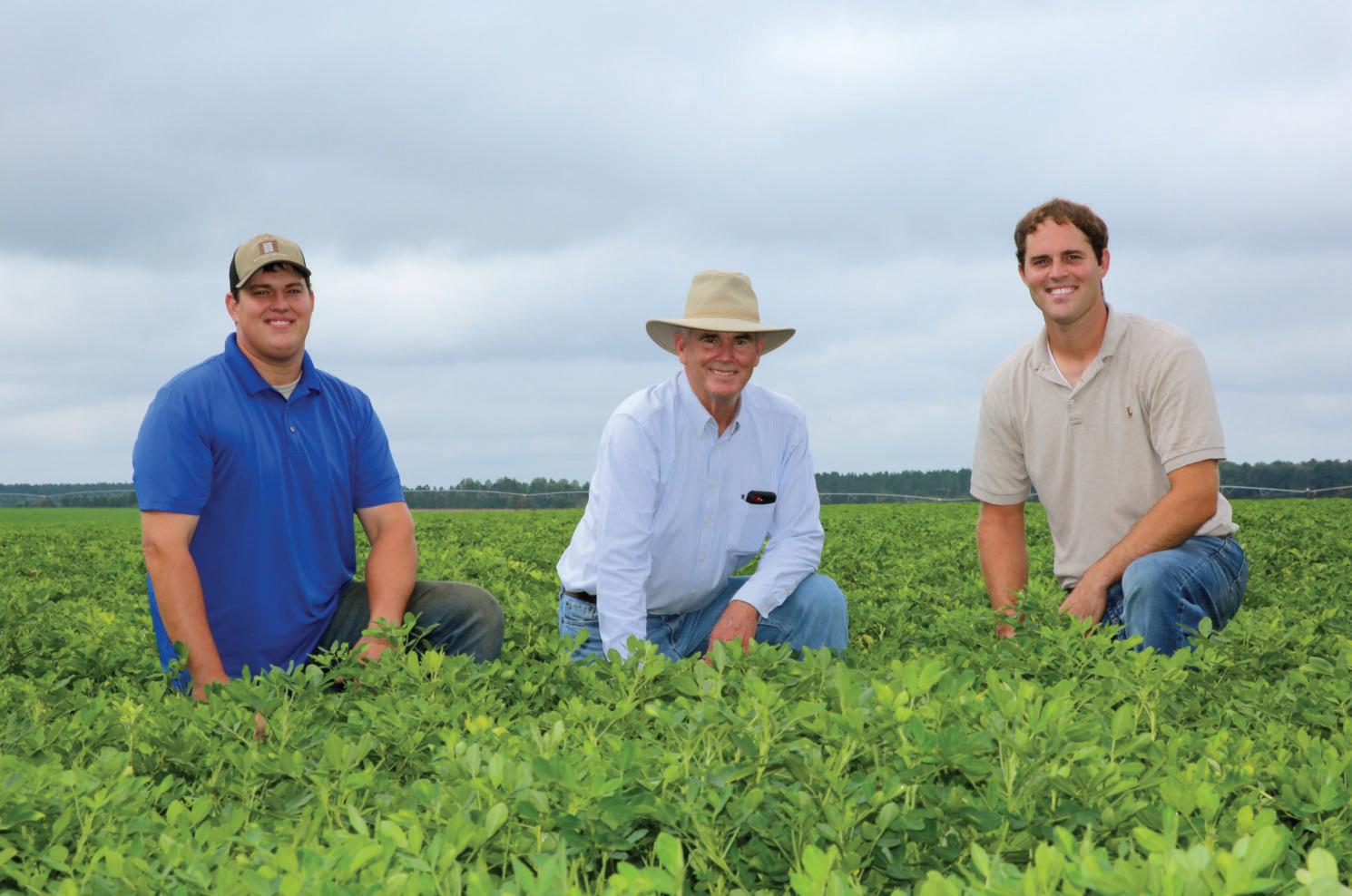

New Staff Join Georgia Peanut Commission and Alabama Peanut Producers Association
Two new staff have Himburg holds a bachelor’s degree in joined the peanut agricultural communications from organizations in Auburn University. While at Auburn, Georgia and Alabama. she was actively involved in
Bryan Tucker joined the Georgia Collegiate FFA and Agricultural Peanut Commission staff in August Communicators of Tomorrow. A as project coordinator for farm and graduate of Ariton High school, she field services. In this role, he will be served as the 2013 Alabama State responsible for education programs FFA Treasurer. for farmers as well as working with Most recently, she held the agriculture organizations and position of social media marketing promotions across the state. Bryan Tucker Abby Himburg assistant manager for SunSouth LLC.
“I’m really looking forward to Degree. During her time at SunSouth she meeting more farmers and being able to Through the years, Tucker has managed the re-design of the company work for them to continue to help grow worked on his family farm and most website and launched a series of customer the future of peanuts here in Georgia,” recently as a business customer service testimonials spotlighted across various Tucker says. technology instructor with Wiregrass social media channels.
Tucker was raised on his family farm Georgia Technical College. Growing up, no trip to town was in Ocilla, Georgia, and graduated from Tucker can be reached by email at complete without a stop at her favorite Abraham Baldwin Agricultural College bryan@gapeanuts.com or phone, 229- roadside stand for boiled peanuts. and the University of Georgia with a 386-3999. Himburg is looking forward to jumping bacelor of science in agriculture business. Abby Himburg joined the Alabama right in and helping tell the story of
He has been active with the Georgia Peanut Producers Association in peanuts and the hardworking farmers that Young Farmers Association and Georgia September as the communications produce them. Farm Bureau’s Young Farmer Program. coordinator. Her project priorities will be Himburg can be reached by email at Through high school and college, Tucker print and digital publications. abby@alpeanuts.com or phone, 334-792was an active member of FFA, receiving Born and raised in Ariton, Alabama, 6482. t many state awards and the American FFA
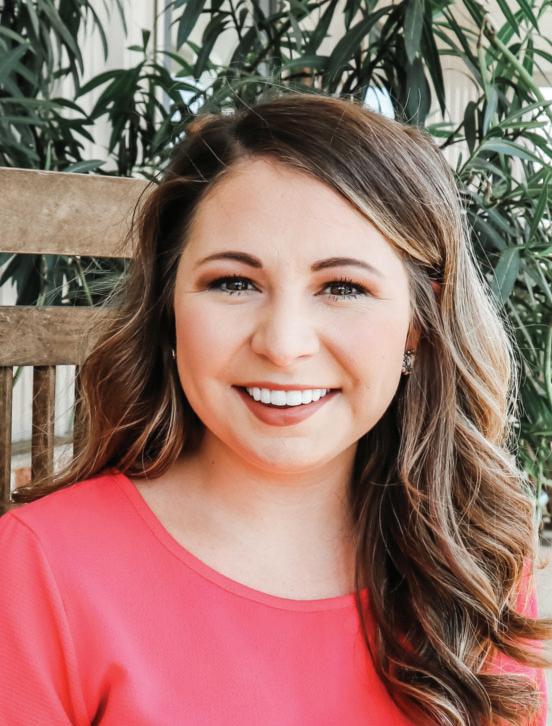


Alabama Peanut Check-off Wins 95% Approval in Referendum
Alabama peanut farmers promotion of delicious and nutrient- in peanut promotion activities around the voted to continue the packed peanuts, peanut butter and other state, contributing to increased peanut current assessment on peanut products,” says Carl Sanders, and peanut butter consumption, and the peanuts that is collected president of the Alabama Peanut adoption of the early introduction of by the Alabama Department of Producers Association and a peanut peanuts to infants recommendations by Agriculture and Industries and farmer in Coffee County. “The more Alabama pediatricians and parents. administered by the Alabama Peanut referendum results are a remarkable Peanut allergy education efforts have been Producers Association (APPA). In a endorsement of the work APPA does on included in the promotion activities as referendum conducted on July 23, 2020, behalf of our peanut farmers.” well. ninety-five percent of those who voted The referendum for peanuts is More than $390,000 has been said “yes” to continuing APPA’s programs conducted every three years, which is a allocated to grower education to share in education, promotion and research. requirement of the Alabama Legislature. relevant research results, legislative
For the continuance referendum to In the last three years: information and other pertinent pass, a majority of eligible producers More than $400,000 has been information for Alabama growers. This voting needed to vote in favor of invested toward peanut production information is dispersed through grower continuing the assessment. Growers who research, in partnership with Auburn production meetings, APPA website produced peanuts in 2017, 2018 or 2019 University and Alabama Cooperative (alpeanuts.com), quarterly newsletters, were eligible to vote. Extension System, which directly benefits social media and emails. The annual
“I am proud of the work we do at the Alabama peanut farmers. This research Alabama-Florida Peanut Trade Show is Alabama Peanut Producers Association. has contributed to yield increases and supported by these funds as well. t The check-off funds production research, more efficient production practices. grower and consumer education, and the More than $700,000 has been utilized BY KAYE LYNN HATAWAY

Hurricane Sally made “What I’ve seen is crops that have landfall near Gulf Shores probably been cut in half,” said Sec. as a Category 2 storm Sept. 16 with maximum sustained winds of 105 mph. The slowmoving hurricane brought wind and rain across the peanut belt. Farms experienced flooding and some collected more than 24 inches of rain over Southern Mississippi, Southern Alabama and the Florida Panhandle. Wind also caused damage to barns, Perdue. “Cotton that was virtually ready to be harvested, peanuts that were ready to be harvested down to half a crop. And there’s not that kind of margin in agriculture.” Ken Barton, executive director of Florida Peanut Producers Association, is very appreciative of Sec. Perdue’s visit. “Peanuts are really taking a hit. We are behind with digging and harvesting Photo credit: Alabama Farmers Federation. irrigation, equipment and more. A concrete irrigation pivot foundation was process. Every day the soils don’t dry out, we are losing yield and quality,” Barton Equipment shed damage from Hurricane Sally at Bitto Farms in Elberta, Alabama. ripped from the soil at Mark Kaiser’s says. “Peanut farmers are extremely farmowner policy, crop insurance or farm in Seminole. resilient, just like all farmers are. For the disaster relief programs.
“This storm just caught everyone off most part, there is a good peanut crop out Donations are tax deductible and may guard,” says Kaiser, Alabama Peanut there, but we hope and pray that we can be made at AlabamaFarmersFoundation.org Producers Association board member. harvest it. We are honored to have Sec. or by check payable to Alabama Farmers “We knew once it slowed like that we Perdue here with us today to learn more Agriculture Foundation at P.O. Box were in trouble. There’s a certain amount about the loss farmers are facing.” 11000, Montgomery, AL 36191. Please of prep you can do but only so much The Alabama Farmers Federation has include “hurricane relief fund” in the time.” established a relief fund to help farmers check memo line.
U.S. Secretary of Agriculture Sonny from across the state whose farms were Farmers are encouraged to visit the Perdue took a tour of crop damage from damaged by Hurricane Sally. Donations U.S. Department of Agriculture disaster Hurricane Sally in Alabama and Florida collected through the relief fund will go assistance programs website online at recently. toward farmer losses not covered by a farmers.gov/recover. t
Registration Open for Hurricane Michael Timber and Irrigation Recovery Block Grant Programs in Florida
Florida Agriculture we enter the next phase of securing relief sustained a minimum of 25 percent loss Commissioner Nikki Fried for producers and landowners, I am more due to Hurricane Michael and the Florida Forest confident than ever in the future of To learn more and register for the Service recently announced Florida’s forest industry as we work TRBG, visit FloridaDisaster.org/timber that registration for the Florida Timber together to get trees back in the ground. To be eligible for the Florida Recovery Block Grant Program and the Thank you to Secretary Perdue for Irrigation Recovery Block Grant Florida Irrigation Recovery Block Grant keeping Florida’s $25 billion timber Program (IRBG), a producer must: Program is now available to agricultural industry at the forefront of recovery l Be the owner of record of center producers and forest landowners who efforts.” pivot irrigation infrastructure at the time suffered damage from Hurricane Michael of application and document that the crop in October 2018. Funded by the U.S. Program Eligibility growing under the center pivot as of Department of Agriculture, the program is To be eligible for the Florida October 10, 2018, sustained a minimum managed by the Florida Division of Timber Recovery Block Grant 15 percent crop loss due to Hurricane Emergency Management in conjunction Program (TRBG), a producer must: Michael with the Florida Department of l Be the owner of record or the l To learn more and register for the Agriculture and Consumer Services lessee who has rights to the timber crop IRBG, visit FloridaDisaster.org/irrigation (FDACS) and the Florida Forest Service at the time of application of a minimum Registration is the first step toward (FFS), which will provide technical of 10 contiguous acres of nonindustrial receiving block grant funds, and should assistance to forest landowners required private forest land located in one of the only take a few minutes to complete. The to produce documentation to receive following counties: Bay, Calhoun, deadline to register for these programs is compensation for their loss. Franklin, Gadsden, Gulf, Hamilton, Friday, November 20.
“It’s been nearly two years since Holmes, Jackson, Jefferson, Leon, The state block grants are part of a Hurricane Michael devastated the Florida Liberty, Madison, Okaloosa, Suwannee, broader $3 billion disaster relief package Panhandle as one of America’s worst-ever Taylor, Wakulla, Walton and Washington to help producers recover from 2018 and storms,” Commissioner Fried says. “As l Have stands of timber that 2019 natural disasters. t
24
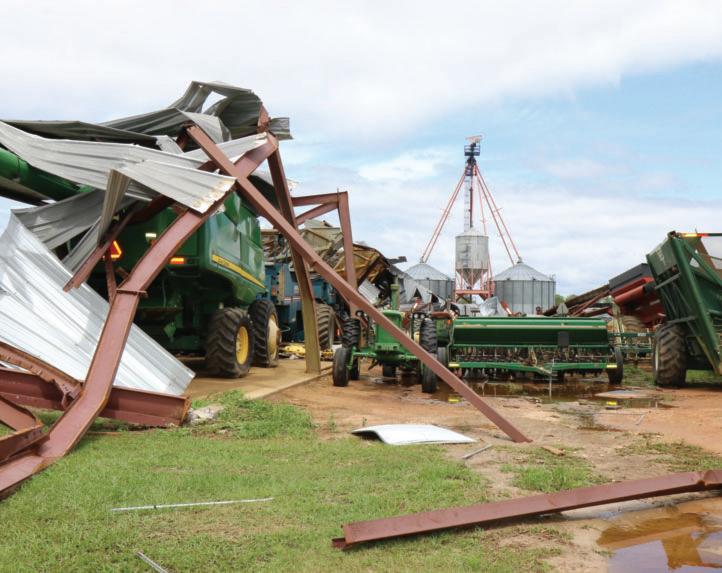


The Peanut Institute Foundation is unveiling four new research projects for 2020-21. TPIF received proposals for forty projects this year from twenty states and four countries.
Dr. Daniel Rosenberg at the University of Connecticut will investigate the daily consumption of 2 ounces of peanuts in 50 participants, ages 50-65 years, over three weeks. The primary aim is to look at changes in colon polyps, which are early signs of colon cancer risk. Preliminary results from this lab indicate a significant reduction of colon polyps with increased peanut consumption. This will be the first known human clinical study in the area of peanut consumption and management. Specifically, the study aims research for consumer messaging and to colorectal cancer that can identify colon to identify if eating peanuts and peanut maximize our resources. This year’s TPIF cell changes. butter long-term can lead to weight loss. Scholar recipients will research three
Dr. Sheau Ching Chai at the From both a consumer and a policy different projects. University of Delaware will examine the perspective, both of these areas of Russell Sage College will look at daily intake of two ounces of peanuts over research are needed. peanut and peanut butter consumption and three months in participants aged 60 and The fourth new research project for cognition in reviewing National Health over. The aim is to measure cognition 2020-21 will be conducted by Dr. Michael and Nutrition Examination Survey before and after the study to identify Roberts of Auburn University. This (NHANES) data. This research will be changes in cognition and memory. The 10-week study will examine the significant for the Dietary Guidelines study will also measure endothelial relationship between peanut powder use 2025. The University of Barcelona will function by examining flow-mediated and muscle quality and growth in 40 conduct a systematic review and dilation (FMD). This measurement will college-aged individuals. Preliminary data meta-analysis on global peanut/peanut add to the body of evidence by supporting from this lab showed muscle improvement butter consumption and longevity. The peanut consumption to reduce (increased muscle thickness and 30% University of Wisconsin-Madison will cardiovascular disease risk. Research that greater protein synthesis) in older look at peanut skin formula as a treatment highlights mechanisms is essential for individuals. No research of this kind has for Crohn’s Disease. These projects will influencing federal policies. been done in a younger population who offer promising looks into new areas of
Dr. Jennifer Keogh at the University tend to be interested in plant-based protein peanut nutrition research. of South Australia will be conducting a powders for fitness. These new projects are all in addition 6-month study looking at peanut/peanut In addition to these four fully funded to current ongoing research projects that butter consumption and weight, satiety, research projects, the TPI Foundation were previously funded. Earlier funded fasting blood glucose, and glucose Scholars Award Program was projects focused on studying peanut tolerance in adults 18 years and older. This implemented in 2020. Our goal is to consumption in individuals with research fills a gap, not only in type-2 provide partial funding to support peanut pre-diabetes, nut and peanut consumption diabetes research (long-term glucose projects that allow us to keep our research associated with long-term weight change control) but also in long-term weight network active, encourage more peanut and use of peanut powder for muscle growth and quality. The Peanut Institute Foundation 2020-21 New Research Projects TPIF anticipates the publishing of these studies in the coming months andColon Cancer UCONN - Dr. Daniel Rosenberg First known human clinical study to look at Cognition Dr. Sheau Ching Chai - University of Delaware sharing results with the peanut industry and the world. For additional information changes in colon polyps through the microbiome Learning, memory, executive function, etc. visit www.peanut-institute.com. None of with peanuts. will also measure endothelial function. this research would be possible without Weight & Diabetes Fitness support from all segments of the peanut Dr. Jennifer Keogh - University of South Australia Dr. Michael Roberts - Auburn University industry. t Can eating peanuts and peanut butter long-term can lead to weight loss and diabetes control? Peanut powder and muscle development in college-aged individuals. ARTICLE PROVIDED BY THE PEANUT INSTITUTE 26 Southeastern Peanut Farmer October/November 2020
